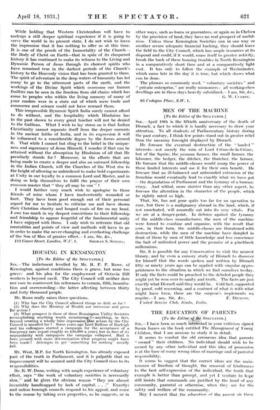HOUSING IN KENSINGTON [To the Editor of the SPECTATOR.] SIR,—The
indictment levelled by Mr. R. P. P. Rowe, of Kensington, against conditions there is grave, but none too grave: and his plea for the employment of Octavia Hill workers is beyond cavil. The City Council will neither dare nor care to controvert his references to vermin, filth, insanita-
tion and overcrowding—the latter affecting between thirty and forty thousand people.
Mr. Rowe really raises three questions.
(1) Why has the City Council allowed things to drift so far (2) Why does the Ministry of Health not intervene and press for action ?
(3) What prospect is there of these Kensington Utility Societies accomplishing anything worth mentioning 7—anything, in fact, beyond creating a wholly false impression that action by the City touneil is uncalled for Y Some years ago Lord Balfciur of Burleigh and his colleagues started a campaign for the acceptance of a fourpenny rate (equal roughly to £50,000 a year), but in face of its unpopularity with ratepayers the campaign collapsed. Had it been pressed with more determination what progress might have been made ! Attempts to get ' something for nothing ' usually fail.
Mr. West, M.P. for North Kensington, has already exposed part of the truth in Parliament, and it is palpable that no improvement will be secured until the City Council rises to its responsibilities.
Mr. R. W. Dana, writing with ample experience of voluntary effort, says " the work of voluntary societies is necessarily slow," and he gives the obvious reason " they are almost invariably handicapped by lack of capital. . . ." Exactly: and unless borough councils respond to his appeal, and come to the rescue by taking over properties, as he suggests, or in
other ways, such as loans or guarantees, or again as in Chelsea by the provision of land, they have no real prospect of useful- ness. Unless these Kensington Societies can in one way or another secure adequate financial backing, they should leave the field to the City Council, which has ample resources at its disposal and could, if it would, rouse itself to greater activity, break the back of these housing troubles in North Kensington in a comparatively short time and at a comparatively light cost. It has only to follow the example of Westminster, which came late in the day it is true, but which shows what can be done.
The phrases so commonly used, " voluntary societies " and " private enterprise," are really misnomers : all working-class dwellings are in these days heavily subsidized.—I am, Sir, &c., 83 Cadogan Place, S.W. 1. G. W. CURRIE.














































 Previous page
Previous page